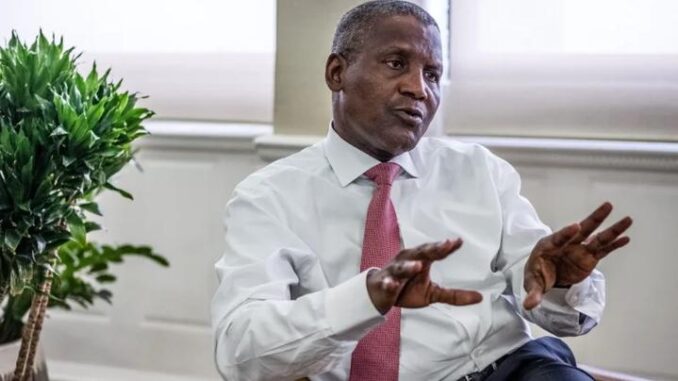
According to an interview by TVC News, Africa’s richest man and industrialist, Aliko Dangote, has raised alarm over sharp practices in Nigeria’s petroleum importation system, revealing that many fuel-importing vessels often fail to discharge their full cargoes. Speaking during a recent media chat, Dangote disclosed that this long-running malpractice has contributed to fuel scarcity, inflated prices, and persistent inefficiencies in the downstream sector.
“Majority of those fuel-importing ships, when they come, they don’t discharge all,” Dangote revealed. “This has been happening for years, and it is one of the reasons Nigerians keep suffering from fuel shortages despite the amount supposedly imported.”
According to him, the practice of under-delivery has drained the nation’s foreign reserves, as payments are made for full shipments while only a portion of the cargo enters the local market. This, he argued, not only enriches a few at the expense of millions of citizens but also keeps Nigeria trapped in dependency and systemic corruption.
Dangote explained that his refinery was conceived to put an end to such practices by ensuring transparency, efficiency, and self-sufficiency in the supply of petroleum products. With local refining, he noted, Nigerians will no longer have to rely on middlemen or shady import deals that leave the economy bleeding.
He further lamented that the absence of adequate monitoring systems at ports and depots over the years made it easy for importers to manipulate figures. “If a ship comes with 100 percent cargo and only discharges 60 or 70 percent, where does the rest go? It means Nigerians are paying for what they don’t use, and the country is losing billions,” he said.
Dangote also emphasized that tackling these irregularities is critical for economic growth, as energy security is directly tied to productivity, job creation, and price stability. He expressed optimism that once his refinery reaches full capacity, it will close the loopholes exploited by unscrupulous players and save Nigeria billions of dollars annually in foreign exchange.
The billionaire industrialist called on government regulators to remain vigilant and strengthen oversight mechanisms to ensure accountability. “Nigeria cannot afford to continue wasting resources on fraudulent practices. We must protect the interest of ordinary Nigerians, not a few vested interests,” he added.
His remarks shed light on one of the hidden factors behind the recurring fuel crises that have plagued the nation for decades, while also reinforcing hopes that local refining will usher in a new era of transparency and stability in the petroleum sector.
Find Verified News At Your fingertips Click The Button Below ⬇️








Leave a Reply